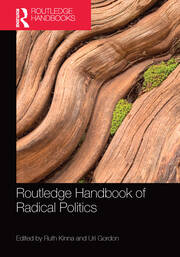Radical media – Routledge handbook of radical politics
Sandra Jeppesen | 2019 | chapter in Routledge handbook of radical politics

Successive waves of global protest since 1999 have encouraged leading contemporary political theorists to argue that politics has fundamentally changed in the last twenty years, with a new type of politics gaining momentum over elite, representative institutions. The new politics is frequently described as radical, but what does radicalism mean for the conduct of politics?
Capturing the innovative practices of contemporary radicals, Routledge Handbook of Radical Politics brings together leading academics and campaigners to answer these questions and explore radicalism’s meaning to their practice. In the thirty-five chapters written for this collection, they collectively develop a picture of radicalism by investigating the intersections of activism and contemporary political theory. Across their experiences, the authors articulate radicalism’s critical politics and discuss how diverse movements support and sustain each other. Together, they provide a wide-ranging account of the tensions, overlaps and promise of radical politics, while utilising scholarly literatures on grassroots populism to present a novel analysis of the relationship between radicalism and populism.
In this chapter, Sandra Jeppesen argues that radical media are central to the promotion of radical political ideas and actions, including developing and sharing radical analysis and discourses. On the one hand, representing marginalised or silenced voices, and on the other, by mobilising and reporting on contentious social protests and other direct actions. Radical media activists are thus key to the propagation of radical social movements, engaging in media and other activism from positions rooted within movements with whom they share social habitus, alternative values, organising practices and political vision. While some scholars suggest that radical media is a niche form of media with a small audience-reach limited to those already active in radical social movements, Jeppesen et al. (2014) have found that radical alternative media have several different objectives, the first two related to propagating ideas, and the second two related to mobilising actions.
